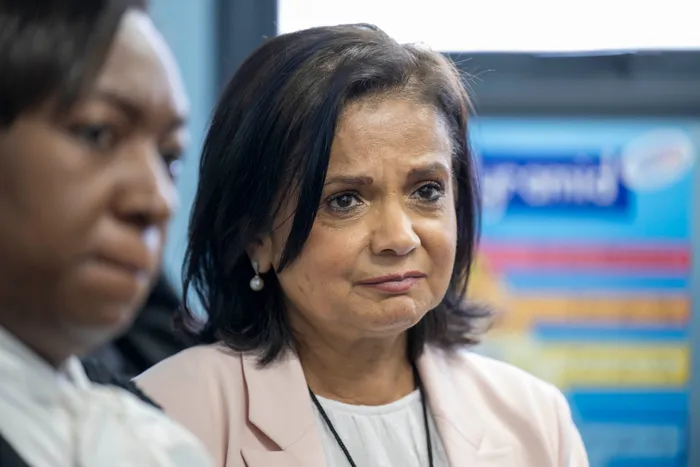The decline of the NPA under Shamila Batohi

Challenges facing the National Prosecuting Authority under adv Shamila Batohi
Image: Henk Kruger
Since her appointment as National Director of Public Prosecutions (NDPP) in 2018, Advocate Shamila Batohi pledged to restore integrity and effectiveness to South Africa’s embattled National Prosecuting Authority (NPA).
Six years on, however, critics argue that the institution is mired in high-profile failures, eroding public trust and casting doubt on its ability to deliver justice.
One of the most prominent disappointments has been the botched prosecution of Nigerian televangelist Timothy Omotoso, who faced multiple charges, including rape, sexual assault and human trafficking.
After eight years, the case ended in a startling acquittal.
The court cited prosecutorial misconduct, poor cross-examination, a lack of corroborating evidence, and an incoherent legal strategy.
Professor Buhle Dube, Director of the School of Law at the University of South Africa, said: “High-profile cases are delicate and require meticulous handling. Unfortunately, the NPA often yields to public pressure, leading to procedural errors that jeopardise justice.”
Despite numerous forensic investigations into corruption at state-owned entities such as Eskom, Transnet and the Passenger Rail Agency of South Africa (PRASA), and damning findings from the Zondo Commission, the NPA has yet to secure significant convictions.
Delayed or non-existent prosecutions have fuelled perceptions that powerful political interests influence justice.
“Since the controversial landing of the Guptas at AFB Waterkloof over 12 years ago, little has been done to tackle corruption decisively,” said political analyst Professor Tumi Senoekane.
“The recommendations from the Zondo Commission have largely been ignored, and attempts to hold influential figures accountable remain stalled.”
Failures to extradite fugitives such as the Gupta brothers and self-styled prophet Shepherd Bushiri have drawn further criticism. Bushiri’s continued evasion of justice exemplifies these shortcomings.
Meanwhile, high-profile murder cases - including those of soccer star Senzo Meyiwa and rapper AKA - remain unresolved, compounding public disillusionment.
The Nulane Investments fraud case, involving a fraudulent feasibility study linked to former Free State Premier Ace Magashule and the Vrede Dairy Project, was described by the court as a “comedy of errors” after key evidence was mishandled and ruled inadmissible.
Dube noted, “Prosecutorial discretion must be applied judiciously and without political or public pressure. The push for quick wins often results in shortcuts that subvert justice.”
Similarly, Political analyst Professor Tumi Senoekane pointed out that “the NPA has failed to execute its mandate in a timely and effective manner. Political interference, resource constraints, and structural deficiencies contributed to this decline.”
Former Executive Director and current Corruption Watch consultant Karim Singh echoed these sentiments.
“The losses suffered by the NPA are demoralising, both for the public and those within the organisation. Stability in leadership and a focus on operational independence are essential for meaningful reform.”
Singh suggested that in terms of the NPA's execution regarding corruption, we need to pay attention now to the operationalisation and function of the Independent Directorate headed up by advocate Andrea Johns.
“Some of the questions towards Johnson regarding how are they learning from these mistakes moving forward as key people at the NPA.”
Although Batohi’s tenure began with high expectations, critics argue it has delivered few tangible results. Calls for reform include reviving the independent investigative model of the now-defunct Scorpions, bolstering resources and instilling a culture of accountability..
“The recent establishment of the Investigating Directorate Against Corruption (IDAC) is a positive step,” said Singh.
“However, more resources and strategic leadership are needed to ensure it fulfils its mandate effectively.”
The Democratic Alliance (DA) has announced plans to hold a media briefing on Friday morning to address what they describe as a deepening crisis within the NPA and the Department of Justice.
The DA said it aims to scrutinise recent failures, including the collapse of the Omotoso trial and the delays in implementing the Zondo Commission’s recommendations.
Conviction rates and the number of criminal cases handled by the NPA have reportedly declined under Batohi, reflecting broader leadership and capacity challenges.
Last month, Justice Minister Mmamoloko Kubayi instructed Batohi to submit a detailed report explaining the Omotoso acquittal and the underlying causes of the NPA’s failure in the case.
This comes despite Batohi’s 2022 commitment to prioritising high-profile corruption prosecutions, following a funding injection from National Treasury.
In a statement on 3 April, Public Interest SA condemned the NPA’s “catastrophic mishandling” of the Omotoso case and urged President Cyril Ramaphosa to take swift action to restore public faith in the institution.
NPA spokesperson, Mthunzi Mhaga said it was unfair to call for Batohi’s head, given that the public perception is based on only two cases so far, which he argued were currently under appeal because the NPA disagrees with the decisions in both cases.
On the Magashule case, he said, “The NPA is considering appealing.”
“We disagree with the judge’s rulings. With respect, I don’t know what else we could have done,” he added.
When asked about the failures in prosecuting state capture, Mhaga said, “There was no clear blueprint for prosecution, and cases needed further investigation.”
“However,” he continued, “We recommended that investigations be rolled out, and many investigations have been declared.
“Of numerous cases related to state capture, only a few have resulted in prosecutions involving assets worth around R14 billion.
“We have since recovered over R8.6 billion in direct corrupt proceeds, with additional funds recovered through tax collections and civil litigation.”
He affirmed that Batohi has done well within the institution, “arguing that it is currently making efforts to build prosecutorial capacity.”
IOL Politics
Related Topics: